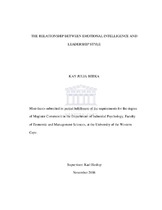| dc.contributor.advisor | Heslop, Karl | |
| dc.contributor.author | Beeka, Kay Julia | |
| dc.contributor.other | Dept. of Industrial Psychology | |
| dc.contributor.other | Faculty of Economics and Management Sciences | |
| dc.date.accessioned | 2013-10-11T09:03:07Z | |
| dc.date.available | 2009/09/30 09:09 | |
| dc.date.available | 2009/09/30 | |
| dc.date.available | 2013-10-11T09:03:07Z | |
| dc.date.issued | 2006 | |
| dc.identifier.uri | http://hdl.handle.net/11394/2247 | |
| dc.description | Magister Commercii - MCom | en_US |
| dc.description.abstract | The 21st century has awakened a call for new leaders to cope with the demands of the rapidly changing world of work which emphasises flatter structures, and a more democratic style of leadership. When looking at the changing competencies of the new leader, it is postulate that leadership takes into consideration the emotional attributes as well as the rational aspects of the individual. From this it becomes evident that the leaders of the 21st century would have to be emotionally intelligent to motivate employees to achieve organizational goals. The aim of this study was to investigate if there is a relationship between emotional intelligence and leadership styles in middle to senior managers. | en_US |
| dc.language.iso | en | en_US |
| dc.publisher | University of the Western Cape | en_US |
| dc.subject | Leadership | en_US |
| dc.subject | Psychological aspects | en_US |
| dc.subject | Organizational behavior | en_US |
| dc.subject | Industrial Psychology | en_US |
| dc.title | The relationship between emotional intelligence and leadership style | en_US |
| dc.type | Thesis | en_US |
| dc.rights.holder | University of the Western Cape | en_US |
| dc.description.country | South Africa | |

